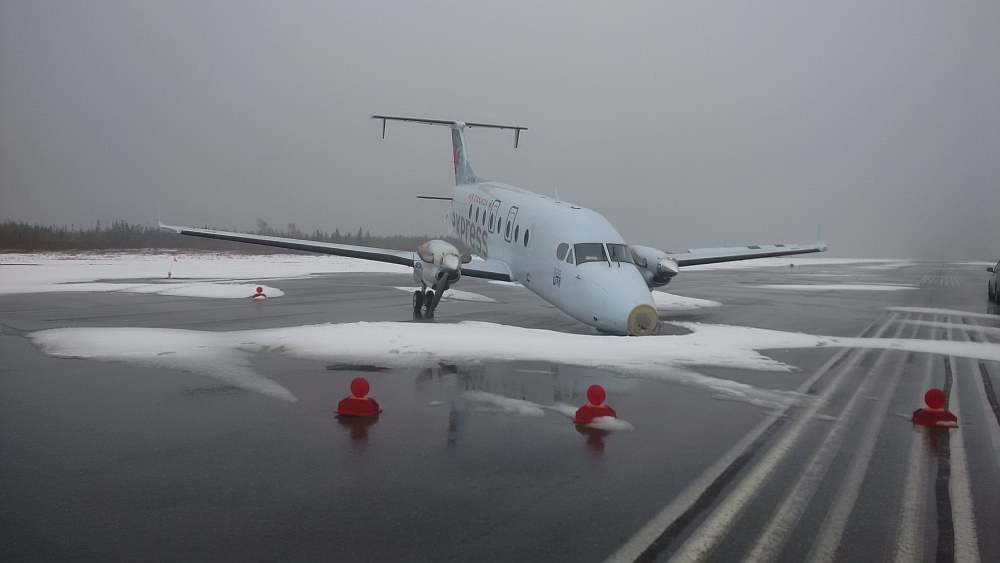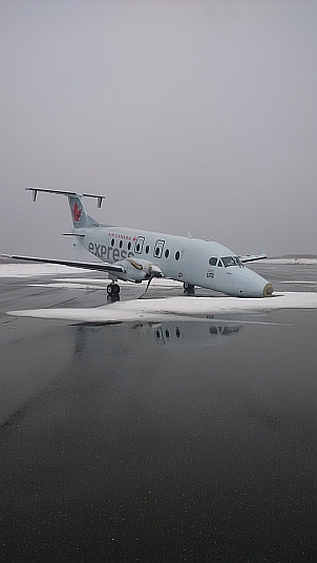Nose landing gear failure on landing
Exploits Valley Air Services
Beechcraft 1900D, C-FEVA
Gander International Airport, Newfoundland and Labrador
The occurrence
On 20 April 2016, an Exploits Valley Air Services Beech 1900D aircraft, operating as Air Canada flight EV7804, was enroute from Goose Bay International Airport, Newfoundland and Labrador, to Gander International Airport, Newfoundland and Labrador. During an attempted landing on Runway 03, at about 9:30 pm local time, the nose landing gear collapsed and the aircraft slid to a stop on the runway. All occupants on board, 14 passengers and two crew members, evacuated safely. Three passengers received minor injuries.
The weather at the time was windy from the north at 36 knots gusting to 52 knots. The visibility was half a mile in light snow and blowing snow, and the ceiling was reported to be 700 feet.
This type of accident during the approach-and-landing phase of flight is on the TSB Watchlist.
Media materials
News release
Gusty winds and blowing snow led to April 2016 nose landing gear collapse at Gander International Airport
Read the news release
Deployment notice
TSB deploys team to the site of an aviation accident in Gander, Newfoundland and Labrador
Dartmouth, Nova Scotia, 21 April 2016 - The Transportation Safety Board of Canada is deploying a team to yesterday's aviation accident in Gander, Newfoundland and Labrador. On 20 April 2016, at approximately 21:30 local time, a Beech 1900 aircraft operated by Exploits Valley Air Services, was involved in a landing accident at the Gander International Airport. There were no serious injuries. The TSB will gather information and assess the occurrence.
Download high-resolution photos from the TSB Flickr page.
Class of investigation
This is a class 4 investigation. These investigations are limited in scope, and while the final reports may contain limited analysis, they do not contain findings or recommendations. Class 4 investigations are generally completed within 220 days. For more information, see the Policy on Occurrence Classification.
TSB investigation process
There are 3 phases to a TSB investigation
- Field phase: a team of investigators examines the occurrence site and wreckage, interviews witnesses and collects pertinent information.
- Examination and analysis phase: the TSB reviews pertinent records, tests components of the wreckage in the lab, determines the sequence of events and identifies safety deficiencies. When safety deficiencies are suspected or confirmed, the TSB advises the appropriate authority without waiting until publication of the final report.
- Report phase: a confidential draft report is approved by the Board and sent to persons and corporations who are directly concerned by the report. They then have the opportunity to dispute or correct information they believe to be incorrect. The Board considers all representations before approving the final report, which is subsequently released to the public.
For more information, see our Investigation process page.
The TSB is an independent agency that investigates air, marine, pipeline, and rail transportation occurrences. Its sole aim is the advancement of transportation safety. It is not the function of the Board to assign fault or determine civil or criminal liability.

